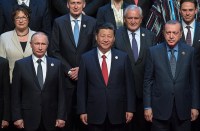A nation cannot survive if it sacrifices its national characteristics to universalist trends. When a nation acts against its own inherent collective nature due to a lust for some alleged higher ideal, one often finds that discontent rather than social harmony is the typical endgame in such experiments. While it is often said that the United States was a nation founded on ideals, these alleged ideals were in fact reflections of the material experiences of the founding fathers of the nation and over time, these cultural characteristics have helped to form a nation that while flawed is also notable for being a place where free speech is not just a clearly defined constitutional law but an overarching cultural characteristic.
Before delving into the particular cultural characteristics of the United States, it must be acknowledged that there is not a single country in the world where speech in favour of the socio-political status quo is censored. If one wants to praise a government’s policies, there is not a single regime on earth that will stop one from doing so. Where free speech principles come into play is when one speaks out against the status quo. The more such an individual speaks out - the more a society’s willingness to embrace, defend and tolerate uncomfortable free speech is tested.
One of the grave mistakes in the analysis of many in respect of Alex Jones’s recent censorship from major online media monopolies is found among those who seek to review or criticise Jones’s content. Of course his content can be reviewed, challenged and criticised as can everyone’s, but this is not a justification for censorship within the context of American cultural characteristics. In the United States, criticism, review and open challenges to someone’s free speech are an end unto themselves - they are simply another person exercising his or her free speech to offer a different opinion to the person whose free speech inspired the reaction.
Leftist American scholar Noam Chomsky has written a private communication now made public by Jones’s Infowars in which he defends Jones’s right to free speech while offering criticism of Jones’s content. According to Chomsky’s response to an enquiry regarding Jones,
“I did appear on Jones’s show, not knowing who he was. When it became apparent, I considered just walking out because it was all so ridiculous, but out of politeness stayed on. What I’ve seen of what he does is outrageous, but unlike many civil libertarians here and especially in other countries, I don’t think that the right way to deal with “hate speech” and crazed fabrications is to ban them; rather, to confront them, and to seek and confront the reasons why anyone pays a moment’s attention to them.
The real story about marginalization of opinion and information is, as always, radically different, and undiscussed”.
While Chomsky and Jones have radically different opinions from one another and come from vastly different background, both now find themselves defending the American cultural characteristic which is to confront controversial speech with equal and opposite free speech rather than to sound the tyrannical call for censorship.
While from a legal standpoint the issues facing Jones are those of the civil right to exercise free speech even on privately owned platforms versus the ultimate right of private property ownership (or in this case private monopolies), the wider cultural questions are even more crucial in the long term. The most fundamental questions for Americans are these: do they want to remain the country whose cultural characteristics produced figures as diverse as Noam Chomsky, Alex Jones, Lenny Bruce, Thomas Jefferson, Frank Zappa, Ralph Nader, Donald Trump, Orson Welles, George Carlin, John and Robert Kennedy, George S. Patton, Larry Flint, Ross Perot, Warren Zevon and Henry Wadsworth Longfellow? Or instead, do Americans want to sacrifice this rich cultural crucible simply because some of the names above had said things that are distasteful in the minds of those who favour the views and works of some of the other names on this list of famously outspoken Americans?
The American tradition is one that does not judge speech on the basis of its right to exist but on the basis of the inalienable right of others to openly discuss the statements in question. The American tradition is one that does not seek to silence others because there is an underlying knowledge that if given the power, others would move swiftly to silence the initial silencers. That is the slippery slope to tyranny and tyranny, like free speech itself is non-ideological. It will simply be used by whoever can get its hands on it. Therefore while free speech is a benign absolutist phenomenon within the cultural context of the United States, tyranny is a dangerous absolutist concept that could forever destroy the fundamental cultural characteristics of the United States beyond recognition.
The American tradition has withstood the anti-leftist McCarthyism of the 1950s and therefore the question now is: can American withstand and survive the tyrannical liberal censorship of the contemporary era?
If the answer is “yes”, it means that America’s most cherished cultural characteristics will survive. If not, it will mean that America is just another nation where pro-status quo speech is tolerated and everything is is censored, marginalised and condemned without giving the original speaker a platform to defend his or her original speech. This is un-American no matter the victim of such oppressive tactics.


